- Home
- Rabindranath Tagore
Selected Poems (Tagore, Rabindranath) Page 9
Selected Poems (Tagore, Rabindranath) Read online
Page 9
Her eyes and murmurs, ‘God, God’;
She takes her son in her arms, covers him
With loving caresses, blesses him, prays for him.
50
Maitra draws her aside and whispers,
‘For shame, you must never say such things.’
Suddenly Annadā rushes up – people
Have told her that Rākhāl has been allowed
To go with the boats. ‘My darling,’ she cries,
55
‘Where are you going?’ ‘I’m going to the sea,’
Says Rākhāl cheerfully, ‘but I’ll come back again,
Aunt Annadā.’ Nearly mad, she shouts to Maitra,
‘But who will control him, he is such a mischievous
Boy, my Rākhāl! From the day he was born
60
He has never been away from his aunt for long –
Where are you taking him? Give him back!’
‘Aunt Annadā,’ says Rākhāl, ‘I’m going to the sea,
But I’ll come back again.’ The Brahmin says kindly,
Soothingly, ‘So long as Rākhāl is with me
65
You need not fear for him, Annadā. It is winter
The rivers are calm, there are many other
Pilgrims going – there is no danger
At all. The trip will take two months –
I shall bring your Rākhāl back to you.’
70
At the auspicious time and with prayers
To Durgā the boats set sail. Tearful
Womenfolk stay behind on the shore.
The village by the Cūrnī river seems tearful
Too, with its wintry morning dew.
75
The pilgrimage is over and the pilgrims are returning.
Maitra’s boat is moored to the bank.
Waiting for the afternoon tide. Rākhāl
Curiosity satisfied, whimpers with homesick
Longing for his aunt’s lap. His heart
80
Is weary of endless expanses of water.
Sleek and glossy, dark and curving
And cruel and mean and spiteful water,
How like a thousand-headed snake it seems,
So full of deceit, greedy tongues darting,
85
Hoods rearing, mouths foaming as it hisses and roars
And eternally lusts for the children of Earth!
O Earth, how speechlessly loving you are,
How stable, how certain, how ancient; how smilingly,
Greenly, softly tolerant of all
90
Upheavals; wherever we are, your invisible
Arms embrace us all, day and night,
Draw us with such huge and rapturous force
Towards your calm, horizon-touching breast!
Every few moments the restless little boy
95
Comes up to the Brahmin and asks anxiously,
‘Grandfather, when will the tide come?’
Suddenly the still waters stir,
Awaking both banks with hope of departure.
The prow of the boat swings round the cables
100
Creak as the current pulls; gurgling,
Singing, the sea enters the river
Like a victory-chariot – the tide has come.
The boatman says his prayers and unleashes
The boat on to the northward-racing stream.
105
Rākhāl comes up to the Brahmin and asks,
‘How many days will it take us to get home?’
With four miles gone and the sun still not set
The wind has started to blow more strongly
From the north. At the mouth of the Rūpnārāyan river,
110
Where a sandbank narrows the channel, a fierce
Seething battle breaks out between the scurrying
Tide and the north wind. ‘Get the boat to the shore,’
Cry the passengers repeatedly – but where is the shore?
Everywhere, whipped-up water claps
115
With a thousand hands its own mad death-dance:
It jeers at the sky in the furious uprush
Of its foam. On one side are glimpses of the distant
Blue line of the woods on the bank; on the other,
Ravenous, gluttonous, murderous waters
120
Swell in insolent rebellion against the calm
Setting sun. The rudder is useless
As the boat spins and tumbles like a drunkard.
The men and women aboard tremble
And flounder as icy terror mixes
125
With the piercing winter wind. Some are dumb
With fear; others yell and wail and weep
For their dear ones. Maitra, ashen-faced,
Shuts his eyes and mutters prayers.
Rākhāl hides his face in his mother’s breast
130
And shivers mutely. Desperate now,
The boatman calls out to everyone, ‘Someone
Among you has cheated the gods, has not
Given what is owing – hence these waves,
This unseasonal typhoon. I tell you, make good
135
Your promise now – you must not play games
With angry gods.’ The passengers throw money,
Clothes, everything they have into the water,
Recking nothing. But the water surges higher,
Starts to gush into the boat. The boatman
140
Shouts again, ‘I warn you now,
Who is keeping back what belongs to the gods?’
The Brahmin suddenly points to Moksadā
And cries, ‘This woman is the one, she made
Her own son over to the gods and now
145
She tries to steal him back.’ ‘Throw him overboard,’
Scream the passengers with one voice, heartless
In their terror. ‘O grandfather,’ cries Moksadā,
‘Spare him, spare him.’ With all her heart
And might she squeezes Rākhāl to her breast.
150
‘Am I your saviour?’ barks Maitra his voice
Rising in reproach and bitterness. ‘You stupidly
Thoughtlessly gave your own son
To the gods in your anger, and now you expect me
To save him! Pay the gods your debt –
155
All these people will drown if you break
Your word.’ ‘I am a foolish, ignorant
Woman,’ says Moksadā: ‘O God, O reader
Of our inmost thoughts, is what I say
In the heat of anger my true word?
160
Did you not see how far from the truth
It was, O Lord? Do you only listen
To what our mouths say? Do you not hear
The true message of a mother’s heart?’
But as they speak the boatman and oarsmen
165
Roughly tear Rākhāl from his mother’s clasp.
Maitra turns his face away, shuts his eyes,
Blocks his ears, grits his teeth.
A sharp cry sears his heart like a whiplash
Of lightning, stings like a scorpion – ‘Aunt Annadā,
170
Aunt Annadā, Aunt Annadā!’ That helpless, hopeless
Drowning cry stabs Maitra’s tightly
Shut ears like a spike of fire. ‘Stop!’
He bursts out, ‘Save him, save him, save him!’
For an instant he stares at Mokadā lying senseless
175
At his feet; then he turns to the water. The boy’s
Agonized eyes show briefly among the frothing
Waves as he splutters ‘Aunt Annadā’ for the last
Time before the black depths claim him. Only
His frail fist sticks up once in a final
> 180
Pathetic grasp at the sky’s protection,
But it slips away again, defeated. The Brahmin,
Gasping ‘I shall bring you back’, leaps
Into the water. He is seen no more. The sun sets.
New Rain
It dances today my heart, like a peacock it dances, it dances.
It sports a mosaic of passions
Like a peacock’s tail,
It soars to the sky with delight, it quests, O wildly
5
It dances today, my heart, like a peacock it dances.
Storm-clouds roll through the sky, vaunting their thunder, their thunder.
Rice-plants bend and sway
As the water rushes,
Frogs croak, doves huddle and tremble in their nests, O proudly
10
Storm-clouds roll through the sky, vaunting their thunder.
Rain-clouds wet my eyes with their blue collyrium, collyrium.
I spread out my joy on the shaded
New woodland grass,
My soul and kadamba-trees blossom together, O coolly
15
Rain-clouds wet my eyes with their blue collyrium.
Who wanders high on the palace-tower, hair unravelled, unravelled –
Pulling her cloud-blue sari
Close to her breast?
Who gambols in the shock and flame of the lightning, O who is it
20
High on the tower today with hair unravelled?
Who sits in the reeds by the river in pure green garments, green garments?
Her water-pot drifts from the bank
As she scans the horizon,
Longing, distractedly chewing fresh jasmine, O who is it
25
Sitting in the reeds by the river in pure green garments?
Who swings on that bakul-tree branch today in the wilderness, wilderness –
Scattering clusters of blooms,
Sari-hem flying,
Hair unplaited and blown in her eyes? O to and fro
30
High and low swinging, who swings on that branch in the wilderness?
Who moors her boat where ketakī-trees are flowering, flowering?
She has gathered moss in the loose
Fold of her sari,
Her tearful rain-songs capture my heart, O who is it
35
Moored to the bank where ketakī-trees are flowering?
It dances today, my heart, like a peacock it dances, it dances.
The woods vibrate with cicadas,
Rain soaks leaves,
The river roars nearer and nearer the village, O wildly
40
It dances today, my heart, like a peacock it dances.
The Hero
Say we made a journey, mother,
Roaming far and wide together –
You would have a palanquin,
Doors kept open just a chink,
5
I would ride a red horse, clip
Clop-clip along beside you, lifting
Clouds of red dust with my clatter
Now, suppose it’s getting darker,
Suddenly we’re blocked by water –
10
What a place, how bleak and wild,
Not a man or beast in sight.
You take fright, feel in our mind
We’re lost. I tell you, ‘Don’t be frightened,
Look, we’ll take that dried-up river.’
15
What a thorny, thistly region –
All the cattle have been taken
Under cover for the night.
How the path we’re taking winds,
Darkness makes it hard to find –
20
Then suddenly I hear you crying,
‘Near the water, what’s that lantern?’
Next thing shouts and yells surround us,
Figures closing in upon us –
All four bearers fall away,
25
Quake in bushes; you remain
Crouched in fear, reciting names
Of gods while I keep calmly saying,
‘I am here, no one shall harm us.’
Just imagine, lāthi-wielding
30
Long-haired desperate villains wearing
Fabā-flowers behind their ears –
‘Stay right there,’ I shout, ‘keep clear!
See this sword? I’ll chop you, pierce
Each man who comes one footstep nearer.’
35
Still they come, leaping and yelling.
You say, ‘No, Oh don’t go near them!’
I say, ‘Sit tight, I can take them,
Watch –’ I spur my horse, at once
Swords and bucklers clash and thud –
40
Mother, you would faint at such
A fight! Some flee; the rest I scupper
Somehow: run them through, behead them.
You think they have surely killed me,
All those hefty men against me,
45
Till I roll up, smeared with blood,
Pouring sweat – ‘The battle’s done,
Come outside,’ I call. You rush
And hug me kiss me. ‘What a lucky
Thing,’ you say, ‘that you were with me.’
50
Life is such a boring matter,
Why are the exciting stories never
True? How this one would amaze
Neighbours, brothers – what? such great
Strength in one so small? My fame
55
Would spread, with everybody saying,
‘What luck he was with his mother!’
Death-wedding
Why do you speak so softly, Death, Death,
Creep upon me, watch me so stealthily?
This is not how a lover should behave.
When evening flowers droop upon their tired
5
Stems, when cattle are brought in from the fields
After a whole day’s grazing, you, Death,
Death, approach me with such gentle steps,
Settle yourself immovably by my side.
I cannot understand the things you say.
10
Alas, will this be how you will take me, Death,
Death? Like a thief, laying heavy sleep
On my eyes as you descend to my heart?
Will you thus your tread be a slow beat
In my sleep-numbed blood, your jingling ankle-bells
15
A drowsy rumble in my ear? Will you, Death,
Death, wrap me, finally, in your cold
Arms and carry me away while I dream?
I do not know why you thus come and go.
Tell me, is this the way you wed, Death,
20
Death? Unceremonially, with no
Weight of sacrament or blessing or prayer?

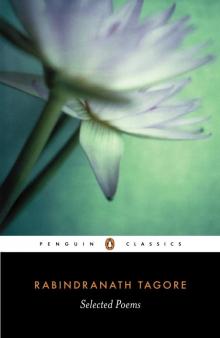 Selected Poems
Selected Poems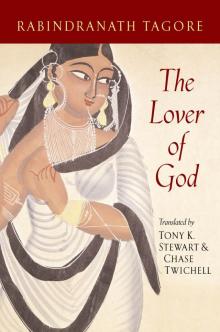 The Lover of God
The Lover of God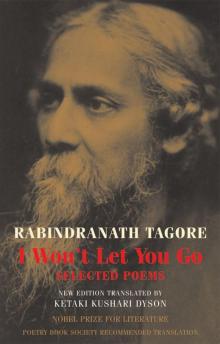 I Won't Let You Go: Selected Poems
I Won't Let You Go: Selected Poems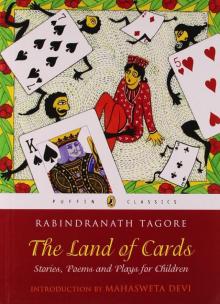 The Land of Cards: Stories, Poems, and Plays for Children
The Land of Cards: Stories, Poems, and Plays for Children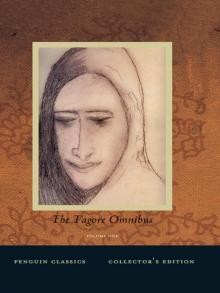 The Tagore Omnibus, Volume One
The Tagore Omnibus, Volume One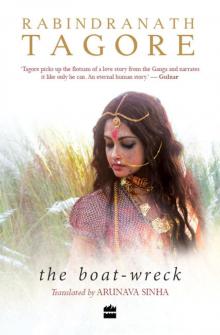 The Boat-wreck
The Boat-wreck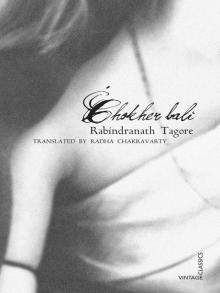 Chokher Bali
Chokher Bali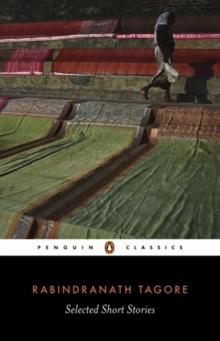 Selected Short Stories
Selected Short Stories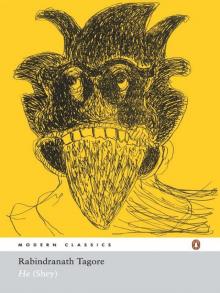 He (Shey)
He (Shey)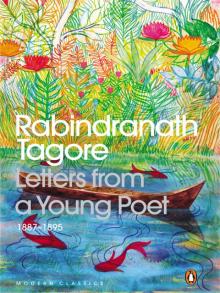 Letters From a Young Poet 1887 1895
Letters From a Young Poet 1887 1895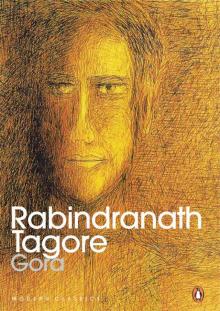 Gora
Gora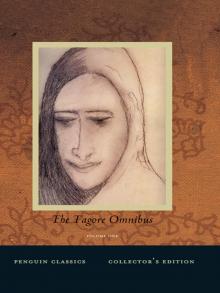 Tagore Omnibus, Volume 1
Tagore Omnibus, Volume 1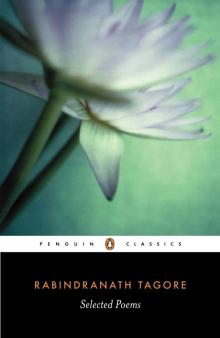 Selected Poems (Tagore, Rabindranath)
Selected Poems (Tagore, Rabindranath)